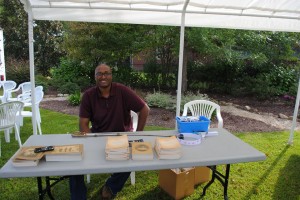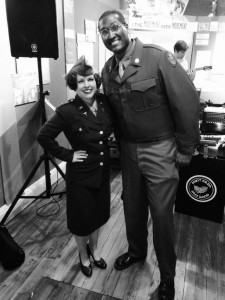Rethinking diversity: Dr. Rhonda Jones, public history is sexy
10 December 2014 – Angela Thorpe
This is the fourth post in a series on issues of diversity in the public history field. Each post in this series is based upon oral interviews conducted with public history professionals. Each interview was conducted in a traditional interview question and answer format. All interviews were edited and condensed based on relevancy and to retain a reasonable length for the posts.

North Carolina Central University student Joshua Trower works a table at the Country Doctor Museum in Bailey, North Carolina, to provide outreach for the Pope House Museum, under the City of Raleigh Museum, in Raleigh, NC. Photo credit: Joshua Trower
Dr. Rhonda Jones is an Assistant Professor and Director of the Public History graduate program at North Carolina Central University in Durham, North Carolina. [1] As one of the few Historically Black Colleges or Universities offering graduate level study in public history, museum studies, or library sciences, Jones sets a standard for public history instruction, training, and practice. By exposing her cohort of emerging public historians, which is comprised almost entirely of students of color, to innovative, practical coursework and diverse fieldwork opportunities, Jones is committed to training capable, well-rounded practitioners whose skills are coveted in any field. Jones offers fresh perspectives on graduate-level training, public history as it relates to students of color, and the state of diversity in the field.
AT: Tell me about yourself.
RJ: I discovered public history as an undergraduate at Howard University, and I worked with my mentor who directed the program, Dr. Elizabeth Clark-Lewis. My first fieldwork experience was working at the Mary McLeod Bethune Museum . . . from there I had [an] experience doing heritage tourism. I was involved with an oral history project with the DC Humanities Council where we interviewed African Americans who had migrated from the South and came to Washington who were living in a senior housing complex. We hosted a series of events that eventually became a documentary. After I graduated, I worked for a little while, didn’t do anything in history, and decided to come back to graduate school and went to Howard for my Master’s in Public History with the intent of working at a museum and doing education and public programming. When I finished the Master’s, I thought, “I’m doing really well, and I might as well just stick with my Doctorate,” because by then 9/11 happened, the bottom fell out, and there was really no place for me to go. Graduating in 2003, my first job was at the Center for Documentary Studies at Duke where I managed the Behind the Veil Project.
I began teaching full time and started working at North Carolina Central in 2007. In 2006 they hired me and two other practitioners to develop courses for the new Public History program. We developed 14 courses total: museum studies courses, archive courses, [a] general intro to public history, oral history. I then was hired the following year to direct the program. We have maybe a core of five or six students that are interested in public history . . . so far I’ve had about maybe five or six students that have taken the comprehensive, and I have one student that has gone on to Middle Tennessee State University to do a PhD in Public History.
AT: Why do you think there is a lack of diverse professionals in the field of public history?
RJ: We’ve been documenting our own history forever. We’ve been performing genealogy, documenting our own family history; we’ve been saving and sharing recipes; we’ve done oral histories. I think . . . you need to extend yourself to these people because they’re not going to come to you. Most of them are not lettered; they’re laypeople, they’re older . . . and they do all kind of things that are under the radar. I had this conversation years ago, and I have yet to meet other people at the conference that everyone goes to of color [Association for the Study of African American Life and History]–not just African Americans but people of color . . . these are practitioners that are doing the work. They’re not writing and publishing in academic thresholds, but they’re doing the work.
I just remember, I did not start off as a history major. I started off studying political science. I was in Washington, that’s what you do. Thinking, “I’m going to go to law school,” and follow that path like everyone else. And my mentor said, “Well, why don’t you take this class, why don’t you sit in on it? Why don’t you just see what we’re doing?” And I thought, “Okay, this is really what I’m passionate about.” I didn’t know it was public history. I never heard of public history.
AT: The students in your program, where are they coming from? Where are you drawing the pool from?
RJ: Well, my students are local. They’ve gone to Central undergrad, and they’ve stayed through grad school for the most part. First of all, no one’s ever heard of public history, but they know me. So I attract students by word of mouth, by reputation. But no one comes to me saying, “I want to do public history.” I have about four students that I’m working with now that I taught at an undergraduate level. Maybe two are doing it with the intention of going into public history but really not knowing what aspect of public history. But they do like public history. And the others are just really taking classes. And they like me, so it’s easy.
I started a library/archives internship at The Museum of the Confederacy, and it ran for about five years. And it was very interesting that, of all the schools in Virginia, they wanted to work with a school in North Carolina. And the fact that we’re a Historically Black College in “enemy territory,” and my students got a chance to process the Jefferson Davis papers. So for five years, I had five cohorts of students having this experience. And then I just decided, well, one position is going to be reserved for an undergraduate who’s interested in library science and archives, and Civil War and southern history. So in the beginning, the main interest had come from my field students who were interested in library science. But eventually the history students realized this could be a great opportunity. And they went, and they did battlefield studies, they did mapping, they processed, they did interpretation. And the arrangement was that the museum fundraised, and allowed them to spend five weeks in Richmond.
AT: Do you feel that your students have any significant take-aways from what you’re teaching them? In terms of public history, and in terms of figuring out what they want to do in the future?

Joshua Trower at banquet for the opening of WWII exhibit at the City of Raleigh Museum, Raleigh. Photo credit: Joshua Trower
RJ: Well, I think that they are learning that there are options. They have a better understanding, and they’re less afraid of following the traditional path. We have real conversations. One of my assignments is, go to one of the public history organizations’ career boards and find a position that would fit you, entry level, graduating with your Master’s. Write a cover letter and apply for the job. I keep stressing, apply as an intern and don’t worry that it’s not paid. Ten hours a week is nothing. But chances are, at some point there will be an opening. And you’ll easily transition to a full-time job from an internship than you would just sending in a general resume. And so I encourage them to understand that history in all levels, in all institutions. We talk about corporate archives, we talk about museum studies, we talk about art, we talk about records management. We talk about everything.
I also feel like fieldwork is the most important thing that you can do in your academic experience. It’s one thing to sit and read and write and research, but until you get out and actually do the work, that’s how you know what you like and don’t like. So as I teach my courses, I work really hard to go out in the community and ask, “Well, what are your needs?” The courses that I teach are designed around fieldwork.
AT: How do you feel the students that you’re training are going to affect the future of the field?
RJ: Whether they affect the field, I think that’s lofty. What I care about right now is I want my students to have jobs because my students have loans. I want them to get as much experience as they can. I even discourage them from studying history because really, you could be a hobbyist and do the work of a public historian. But if you’re going to do this, you need to have an interdisciplinary approach and take marketing classes and business classes and learn the HR [human resources] side to this because this is a business. They need to know how to make payroll, how to write grants, how to keep the lights on and the doors open. I keep telling my students, all these other people that have these other disciplines are getting your jobs. You can’t spend your life just writing book reviews and then graduating with a Master’s degree and no experience.
AT: How would you respond to those who feel that diversifying the field is a “luxury issue”?
RJ: Well, I just think you have to have diversity because you have different voices and different interpretations. I think what has been frustrating for people of color is to have people come into their communities, and it’s a sense of encroachment. Or to go into a museum or a historic site, and it’s not welcoming. For this semester, one of my assignments is my students have to contact a site manager at one of the 27 historic sites listed on the Department of Cultural Resources and ask them what steps are they taking to make the interpretation more inclusive to others. Not just the story of the South, not just the story of race relations between African Americans and whites. We have so many more newcomers with the Latino population growing. There are Asians in the South. There are people from Pakistan who are coming here and working in RTP [Research Triangle Park]. Do they feel, “I could go there, and I could learn something, and there will be a takeaway for me in my new country”?
AT: Did you have any final reflections on the state of diversity in the field? Any suggestions for the field moving forward?
RJ: I do think the field has certainly changed in the last 20 years. I remember going to my first AHA [American Historical Association] conference, and they weren’t really open to public history. And to see now that you have the esteemed, established, elite organization that’s kind of embracing it.
And you know public history is kind of sexy. It’s the thing to do, it’s attracting students, it’s making history approachable. It’s all the things that the traditionalists hated about it. And now it’s a bandwagon thing. So it’s nice to see that there are other interpretations, that there are other considerations. But it’s still a problem in that the projects and interpretations are still coming from the same people. So it’s still very institutional.
[1] North Carolina Central University offers an MA degree in History with a Certificate or Concentration in Public History.
~ Angela Thorpe is a graduate of the Museum Studies MA program at the University of North Carolina at Greensboro. She is an oral history researcher with The HistoryMakers African American video oral history archive in Chicago, IL.




1 comment